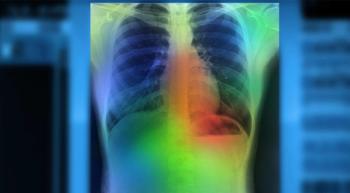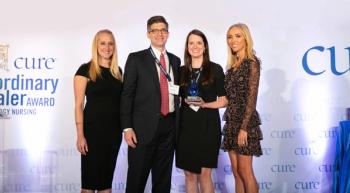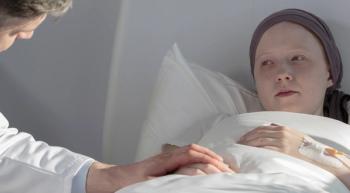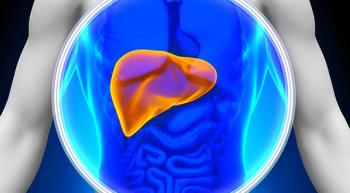
The founder of Imerman Angels explains how the organization pairs patients with survivors who can mentor them through the cancer experience.

The founder of Imerman Angels explains how the organization pairs patients with survivors who can mentor them through the cancer experience.

In a talk about her new book, Vanessa Bayer explains how leukemia contributed to her comic perspective and sense of empathy.

Following surgery with medication, combining immunotherapies or targeted drugs and adding radiation to immunotherapy can improve effectiveness in treating various stages of melanoma.

With greater longevity for survivors of melanoma comes the need to treat lingering side effects and monitor for cancer recurrences.

Precision medicine has prolonged life for many with lung cancer, giving them opportunities to support those who are newly diagnosed.

Through community outreach, the Cholangiocarcinoma Foundation aims to increase tumor profiling and clinical trial participation.

Christopher Harington Dwyer, founder of CLL Canada and online chat contributor, leaves a legacy of support and knowledge.

Walgreens expands health and beauty support program for patients with cancer.

Menopausal women who take hormonal therapy after surgery for breast cancer may be prone to long-term “chemo brain” – potentially benefitting from cognitive therapy or other interventions.

Evaluations can identify the potential for drug interactions and predict whether older patients are fit for chemotherapy.

Patients with ovarian cancer tend to underreport their most challenging symptoms; however, an analysis of their online comments could give health care providers insight into how to help.

In this week’s episode, we spoke with entertainment journalist Giuliana Rancic, who discussed her breast cancer journey and how, at the end of the day, she continued to tell herself, “This, too, shall pass.”

In essays by patients and colleagues, three nurses were honored for their generosity and life-changing compassion.

Despite emotional testimony from women who say their breast implants made them sick with cancer or autoimmune symptoms, the Food and Drug Administration (FDA) has no plans to ban the textured implants that are being blamed.

A hospital whose mission is to cure children’s catastrophic diseases is not only providing treatment, but also conducting research and making new medicines. Now, in addition to improving its patient-care and research capabilities, it plans to reach into low-income countries to help cure more children with cancer.

The Childhood Solid Tumor Network at St. Jude is helping scientists inside and outside the hospital’s walls to expand treatment options for youngsters with these cancers.

St. Jude Children’s Research Hospital is offering cloud-based access to the fully sequenced genomes of 10,000 pediatric patients with cancer, in the hopes that sharing the information will lead to the highest possible number of treatment breakthroughs.

The U.S. Food and Drug Administration (FDA) will give a priority review to the experimental targeted drug fedratinib as a potential treatment for the blood cancer myelofibrosis.

The Tutu Project uses unique landscape photos to raise money for patients with breast cancer.

Brian Boyle, who plays center for the New Jersey Devils, has announced that his blood cancer is in remission.

Supreme Court Justice Ruth Bader Ginsburg has survived three types of cancer and has not missed a day of work.

A daily dose of diet soda may help protect survivors of colon cancer from disease recurrence and death.

Banishing sugar and extra body fat can be important tools in preventing cancer.

Bob Einstein, ‘Super Dave’ and ‘Curb Your Enthusiasm’ actor, dies of cancer at age 76.

“Love, Gilda” fea­tures never-before-seen diaries, audio and videotapes from the collection of Gilda Radner, who died at age 42 of ovarian cancer.

The Cholangiocarcinoma Foundation has won a grant from Bayer to create a website and outreach to patients and doctors to let them know that all patients with the disease need to have their tumors sequenced, because there are existing medicines and clinical trials that may help patients with actionable mutations more than the standard of care.

Targeted drugs and immunotherapies are still on the horizon for people with cholangiocarcinoma, or bile duct cancer.

A lot is still unknown about the causes of cholangiocarcinoma, because this type of cancer, which affects the bile ducts inside or outside the liver, is so rare.

The investigational targeted drug zanubrutinib (BGB-3111) appeared to be highly active, inducing an overall response rate of 83.5 percent in patients with relapsed/refractory mantle cell lymphoma, who were treated in a single-arm, open-label, multicenter, phase 2 trial.

Researchers from the National Cancer Institute’s Division of Cancer Epidemiology and Genetics analyzed 129 studies of more than 40,000 women in Europe, North America and Asia (34,432 with postmenopausal bleeding and 6,358 with endometrial cancer) conducted between 1977 and 2017.